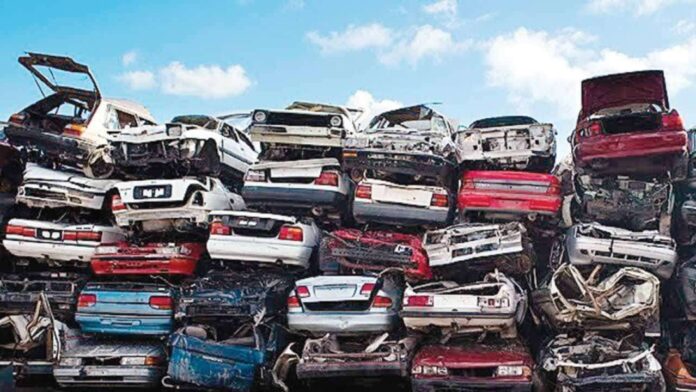In India, when a car is older than 15 years, the owner has two options in front of them – to carry out the vehicle’s fitness test, transfer it to another state and have it re-registered or scrap the old vehicle. Old cars, by virtue of having undergone immense wear and tear, heavily contribute to the pollution levels anywhere, which is why a National Green Tribunal (NGT) order in 2020-21 called for a ban in Delhi for cars older than 15 years. Therefore, the Regional Transport Offices (RTOs) in India have stopped taking fitness tests of such old vehicles or re-registering them.
What is Vehicle Scrapping?
Vehicle scrapping in India is an option for car owners who do not want to transfer their old car to another state for re-registration. Transferring a car, especially an old one, comes with a lot of hassles and documentation. While buying or renewing your car insurance online is a simpler part of the documentation process, the other paperwork is tedious and time-consuming. Hence, many car owners who want the easier way, opt for car scrapping. Most people with old vehicles, who want to give it away for scrapping, choose to have the cheapest car insurance they can get till the time the car is scrapped.
The scrapping process involves chopping up the car into pieces and having the parts recycled. The spare parts of old cars can often be illegally resold for an unfair price, and hence, the scrapping process is necessary.
The Vehicle Scrappage Policy in the Union Budget 2021
The voluntary Vehicle Scrappage Policy announced by Finance Minister Nirmala Sitharaman in the Union Budget 2021 will phase out unfit and old vehicles. This policy is expected to curb the pollution levels in the country and also reduce India’s fuel import bills.
According to the policy, old cars that are more than 15 years old will have to undergo a fitness test. If they pass the mechanical test, the owners will be allowed to retain them. However, retaining a car that is older than 20 years could come at a cost in the form of a Green Tax. Apart from that, the car owners will also have to pay for the fitness test of such old cars. Only cars that truly fit will be allowed to ply across India.
The Impact of Car Scrapping on your Car Insurance
The process of car scrapping involves a lot of documentation, which also includes car insurance. Before having the car scrapped, it is important for the car owner to submit an affidavit along with an application for scrapping and de-registering the car. The affidavit confirms that there are no pending loans or court cases that involve the car.
When it comes to the insurance, a pending car insurance claim can prevent you from completing the documentation. Therefore, it is important to ensure that your insurance provider settles your claims before you submit the documents for scrapping your car. To avoid any issues in the claim process, be sure to pay your vehicle insurance online on time.
Also, make it a point to ensure that your car is actually scrapped and not sold off by the scrap dealer. This could lead to a lot of legal issues as the vehicle is registered in your name. The problems could lead to difficulties in buying new car insurance in the future. Buying car insurance is simple and easy; however, with legal issues against you, it may be difficult to buy an insurance policy.
What Should You Know About Vehicle Scrapping?
When undertaken legally, this is what the process of car scrapping should entail, as per the RTO rules:
1. Before the scrap is sent out for recycling, the chassis number is taken out.
2. Always approach an authorised scrap dealer for car scrapping who will ensure that the scrapping does not harm the environment. The dealer inspects the car, quotes a price based on the car’s weight and then removes and separates the car’s parts into iron, plastic, rubber, etc.
3. The RTO should be aware of the scrapping of the vehicle as they will deregister the car. Additionally, it is also necessary that you inform your insurance provider about the scrapping.
4. While it is not necessary to submit your original registration certificate to the scrap dealer, a photocopy of the same is a must.
5. Make sure to take pictures of the scrapped car as evidence so that the further procedures at the RTO can move smoothly.
Insurance for Old Cars
The value of a car depreciates over the years and after 5 years, the IDV of the car is an amount mutually decided upon by the policyholder and the insurance company. But an insurance policy is mandatory since most old cars carry a certain amount of risk and may not perform at their best capacity at times. As with new cars, the IDV of an old car should also reflect the vehicle’s actual value, which brings down the premium calculation. Hence, insurance for old cars has, though not compulsorily, a lower premium rate.
Conclusion
Old cars that need to be scrapped should still be protected by car insurance till the time the scrapping procedure begins. To do this, you can use a car insurance premium calculator to find out the cheapest car insurance possible so that you can pay affordable premiums for your vehicle.



